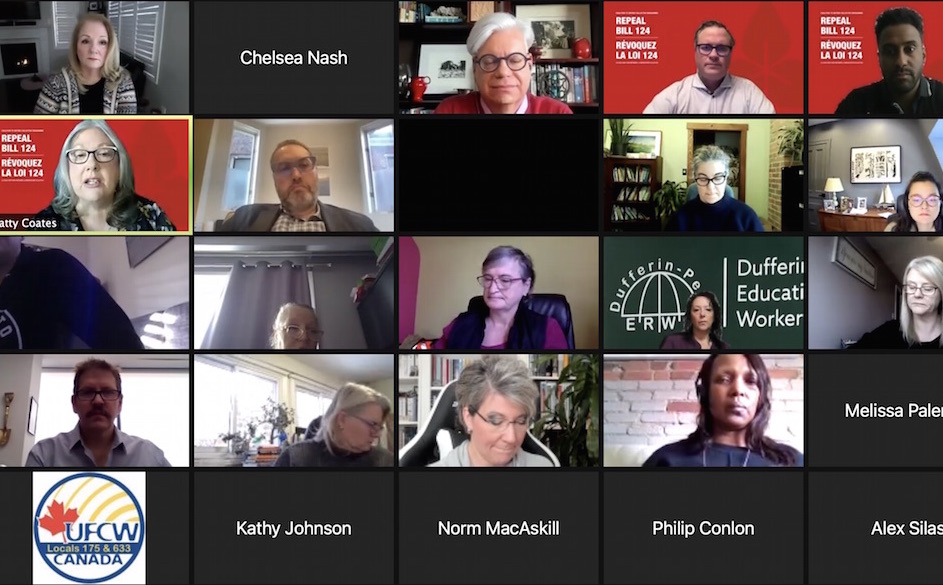At any time, but particularly during a pandemic, imposing limits on workers’ ability to bargain for fair wages and better benefits is “unconstitutional,” say union leaders.
Ontario’s Bill 124, passed into law in November 2019, is the subject of an ongoing constitutional challenge brought forward by a coalition of 40 unions and labour associations. The “Coalition to Defend Collective Bargaining” announced in a press conference last week that it had filed evidence to support its legal challenge of the provincial legislation.
The bill, titled the “Protecting a Sustainable Public Sector for Future Generations Act,” sets limits on wage increases for the province’s public servants, including health-care workers, teachers, and some long-term care workers.
Under the act, once any given contract expires, compensation increases for public employees are to be limited to one per cent per year for a three-year moderation period. This includes salary increases and other entitlements, meaning the one per cent limit also pertains to benefits and paid sick days.
According to the provincial government, the purpose of the act “is to ensure that increases in public sector compensation reflect the fiscal situation of the Province…and protect the sustainability of public services.”
Even in 2019, before teachers, health-care workers, and others found themselves working on the front lines of the pandemic, there was significant backlash to the legislation by the public-sector workers affected, particularly teachers.
A mere month after the bill passed into law, the Ontario Federation of Labour announced it had formed a coalition of unions that intended to launch a legal challenge against the act.
At that time, the coalition was made up of 10 unions. As of last Tuesday, it was over 40.
The coalition alleges that Bill 124 breaches the constitutional right to freedom of association, which includes the right to collectively bargain and the right to strike.
“Bill 124 runs roughshod over free collective bargaining, and fails to respect what every experienced negotiator understands: the collective bargaining parties themselves are best able to negotiate agreements that reflect fiscal and workplace priorities and realities,” said Steven Barrett, one of the lawyers for the coalition, in a December 2019 statement.
Last week, labour leaders lamented that Bill 124 had become even more unjust due to the ongoing pandemic, contrasting Premier Doug Ford’s appraisal of front-line pandemic workers as “heroes” while continuing to impose limits on the wages, benefits, and sick days the workers are able to negotiate.
One critique of the bill is that regardless of the fiscal state of the province, public servants shouldn’t have to bear the burden of balancing the budget.
“It was clear then, before the pandemic, that Bill 124 was a legislated attempt to blame workers for something they didn’t cause,” said Fred Hahn, president of CUPE Ontario at the joint conference.
Now, the coalition of unions is contrasting the attention and public favour that front-line workers have garnered over the course of the pandemic — including from the premier himself — with the limits on actual, monetary value workers are awarded.
“Today, blaming workers for a deficit they didn’t create, tying their wages and benefits to something that has some scraping by — if they can get by at all — is in my personal view starting to verge on criminal,” said Hahn.
Throughout the pandemic, labour activists, public-health experts, and an array of politicians have been calling for the province of Ontario to legislate paid sick days for all workers to limit the spread of the virus and to allow people who could not afford to miss a day’s pay to take the time off to rest and recover from illness.
While the government has refused to legislate mandatory paid sick days, Bill 124 makes it “impossible” for unions to even try to bargain for increased sick leave coverage, said Barrett on Tuesday.
Most of the one per cent increase is going towards salary increases, Barrett said, so there’s no room left over to increase the number of paid sick days. Negotiating one week (five days) of paid sick leave would roughly take up the entire one per cent, he said.
“There’s simply no room in the incredibly limited measure that the government has imposed.”
Union leaders also pointed out that most of the public service jobs affected by Bill 124 are undertaken by women, many of whom are women of colour.
“If there’s one thing that can come out of this crisis…[it’s that] we should be able to establish that care work is valuable work, that women’s work matters,” Hahn said.
He questioned how one could actually measure the value of looking after one’s children, their grandparents, or other care work.
“It’s difficult to value,” he said. “But we know this: it is undervalued.”
The coalition is hopeful they can win their constitutional challenge, given similar legislation in Manitoba was struck down in June of last year.
Manitoba’s Bill 28 — called the “Public Services Sustainability Act” — imposed a two-year wage freeze on its public servants following the expiration of their contracts, followed by yearly limits to wage increases of just 0.75 per cent in the third year, and one per cent in the year after that.
In that case, a Manitoba judge ruled the legislation unconstitutional because of how severely it limited unions’ collective bargaining power.
“The overall impact of the legislation on a process of collective bargaining rises to the level of substantial interference,” said Justice Joan McKelvey in delivering her decision.
Chelsea Nash is rabble’s labour beat reporter for 2020-2021. To contact her with story leads, email chelsea[at]rabble.ca.
Image: Screenshot from February 9, 2021 press conference
Editor’s note, February 16, 2021: The headline on this story has been edited. An earlier version referred to “health-care workers.” This has been changed to “front-line workers” to better reflect the focus of the story.




